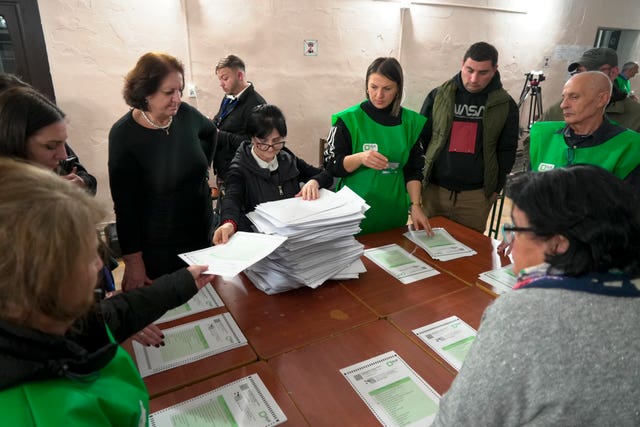The Central Election Commission reported that Georgian Dream won 54.8% of the vote on Saturday with almost 100% of ballots counted.
After a divisive election campaign, initial figures indicated voter turnout was the highest since the ruling party was first elected in 2012.
Georgian election monitors, who deployed thousands across the country to monitor the vote, reported numerous violations and said the results “did not correspond to the will of the Georgian people.”
The Georgian Dream is becoming increasingly authoritarian, passing laws similar to those used by Russia to suppress free speech. Brussels has suspended Georgia’s EU membership process indefinitely over a “Russian law” passed in June.
Bidzina Ivanishvili, the billionaire founder of Georgian Dream, who made his fortune in Russia, announced victory almost immediately after the polls closed, saying: “It is rare in the world that the same party achieves such success in such a difficult situation.”
Before the election, he promised to ban opposition parties if his party won.

Tina Bokuchava, head of the opposition United National Movement (UND) party, accused the electoral commission of carrying out Mr Ivanishvili’s “dirty order” and said he “stole victory from the Georgian people and thus stole the European future”.
She indicated that the opposition will not accept the results and “will fight like never before to reclaim the European future”.
The UNM party said its headquarters were attacked on Saturday, while Georgian media reported that two people were injured in attacks outside polling stations.
The election campaign in the South Caucasus nation of 3.7 million people, which borders Russia, was dominated by foreign policy and marked by a fierce battle for votes and accusations of a smear campaign.
Some Georgians complained of intimidation and pressure to vote for the ruling party.
Georgian Dream scored the highest share of the vote – almost 90% – in the Javakheti region of southern Georgia, 83 miles west of the capital Tbilisi, where it failed to get more than 44% of the vote in any region.
The Associated Press visited the region ahead of the election, where many people are ethnic Armenians who speak Armenian, Russian and limited Georgian. Some voters suggested they had been instructed how to vote by local authorities, while several questioned why Georgia needed a relationship with Europe and suggested it would be better to ally with Moscow.
About 80 percent of Georgians support joining the EU, according to polls, and the country’s constitution obliges its leaders to seek membership in the bloc and NATO.
Many fear that the Georgian Dream is pulling the country towards authoritarianism and killing hopes of EU membership.
